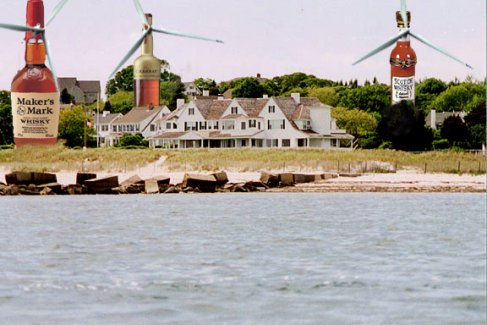From Bloomberg's Echos blog:

Harold Bride, the Titanic's
wireless operator, being carried off the ship, 1912.
Source: Library of
Congress Prints and Photographs Division
We remember the Titanic for its epic technological hubris. But the ship's sinking also marks the moment when a more modest technology, the wireless radio, began to transform the shipping industry.
As an example of the Progressive-era faith in technology, the Titanic is hard to equal. In addition to its sumptuous interior, the ship was able to churn across the ocean at a staggering 22.5 knots. It was also outfitted with the most sophisticated wireless-telegraph technology available, with a range of nearly 1,000 miles.
While the speed was central to the ship’s operation, the wireless radio was considered a novelty.
The ship's telegraph was operated by the Marconi Company, and its purpose was primarily for passengers to send and receive personal messages. Although the wireless could, and did, receive signals from other ships, such as weather reports and ice warnings, that purpose was entirely secondary.
In fact, there wasn't even a direct line of communication between the wireless operating rooms and the bridge. After the Titanic collided with an iceberg on the night of April 14, 1912, Captain Edward Smith had to physically walk down to the wireless room and ask the operators to send an emergency signal.
Harold Bride, a wireless operator on the ship, had joined Marconi less than a year earlier. But according to contemporary accounts he was pivotal to the rescue, since he knew both the continental and the American versions of Morse code, as well as the new emergency signal -- SOS.
When 705 survivors of the disaster were taken aboard the Carpathia, the transatlantic steamship that came to the Titanic's rescue, wireless transformed from a plaything into a necessity. Bride, once aboard the Carpathia, “never was out of the wireless room,” helping to transmit personal messages and lists of survivors back to shore. He recounted that he “saw nothing of Mrs. Astor or any of them. I just worked the wireless.”
After the tragedy, radios became a standard part of shipping -- to the point that within a decade the radio signal was the true identity of a vessel, not its flag. By 1932, even small coastal tugs were legally declared to be “unseaworthy” without a radio.
Radio, of course, wasn't limited to the seas, but that was where its business began. Popular radio, as we experience it today, really stems from marine and especially transoceanic radio, as General J.G. Harbord, president of Radio Corporation of America, wrote in 1929. Habord remarked that what we think of today as the purpose of radio -- music and talk -- was actually the “surprise.”...MORE
*From our 2010 post, "Cape Wind Approved, Kennedy Family on Board, Patriarch Joe Wasn't a Bootlegger!":
...Here's the eco-friendly Kennedy family's Compound, from the water...

Which referred back to2007 post, "Robert Kennedy Jr., Global Warming and Wall Street":
Joe used the money to get his kid into the Senate and from there, the Presidency /...According to Wikipedia Robert Jr.'s grandfather bought the property in 1928. Already a wealthy man Joe Kennedy had another Wall Street trick up his sleeve, a classic pump-and dump. In 1929 he and some other rascals got together to run the .com of the day, Radio Corporation of America.
What a run it was! The pool picked up $5 million in ten days. My BLS inflation calculator says that's a bit over $60 million today (although the PBS special linked below says $100 million).
When the question arose as to who should manage the pool the answer was easy. Who better than the specialist in the stock, Michael J. Meehan! PBS did a good job on their show "The Crash of 1929", even interviewing Meehan's grandson. Here are some of my links, Senate Hearings (4 page PDF), 1948 SEC chief counsel memo on the Act of '33 (5 page PDF), Colliers story on the early SEC.
One of Joe Kennedy's most quoted comments:"It's easy to make money in this market," said Kennedy, famously, to an associate. "We'd better get in before they pass a law against it."It must run in the family "We got ours, now you, git..."
UPDATE: Here's a must see video via the Wall Street Journal's Environmental Capital blog.
“Dear Jack. Don't buy a single vote more than necessary. I'll be damned if I'm going to pay for a landslide.”-John F. Kennedy responding to allegations his dad was going to buy the election, by pretending to read a telegram from his father.